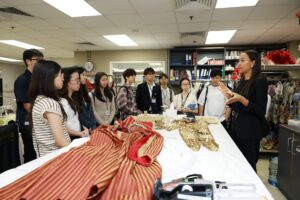The innovation and diversity of Macau’s food culture has earned it the title of “City of Gastronomy”. New Macau explores what makes Macau’s cuisine so special.
The Macau SAR Government has always been committed to promoting Macau as a unique creative capital of the world. In November 2017, Macau was designated by UNESCO as a “Creative City of Gastronomy”.

The diversity of Macau’s food culture attracts attention from across the globe. Everyone can find their favorite taste in this city, from traditional Chinese and Portuguese to authentic “Macanese” cuisines, from unique local snacks sold on the side of the streets to spectacular dishes in fine dining restaurants.
“With the support of a well-developed tourism and entertainment industry, the diversity of foods and beverages has made Macau an internationally recognized city of Gastronomy,” Ho Chi Kit, President of the United Association of Food and Beverage Merchants of Macau, told New Macau.

“The catering industry in Macau is divided into two sectors, one for the residential areas and the other for high-end catering in hotels. High-end catering is supported by the tourism and gaming industries and has developed to the Michelin level – especially those restaurants running in resorts which have adequate ancillary facilities and give customers excellent bang for their buck.”

Legislator Lei Leong Wong believes the successful designation of Macau as a “City of Gastronomy” is closely related to its history and culture.
“Macau is a city where Eastern and Western cultures entwine, thus our cultures, lifestyle and cuisines are influenced by both Chinese and Western cultures,” he explained.

“Macanese Cuisine”
During the Age of Discovery in the 16th Century, the Portuguese brought their Iberian Peninsula cooking style to the Far East and Macau. Mixing Portuguese and Chinese cooking styles and cuisines, they created the unique local gastronomic cuisines in Macau – the “Macanese Cuisine”.
“Macanese Cuisine” is reputed as the most representative local cuisine of Macau and is recognized worldwide. It was listed on the scope of Intangible Cultural Heritage of Macau in 2012 and was recognized by UNESCO as the world’s first fusion cuisine. In 2021, China’s State Council announced the National Intangible Cultural Heritage List, and Macanese Food was successfully selected and included on the list.

Diversified Dining Experience
The title of “City of Gastronomy” has created substantial business opportunities for Macau. A total of 2,265 catering venues were operating in Macau in 2016, according to official figures. However, catering venues increased to 4,725 by 2022, representing an increase of 109% over these six years. The latest “MICHELIN Guide Hong Kong & Macau 2024” awarded 16 restaurants with a total of 26 stars in Macau. Meituan, the leading e-commerce platform for food and beverage in mainland China, released the “Black Pearl Guide” and selected 17 restaurants in Macau for their list.

“Macau is an amazing place – a small area with many MICHELIN and Black Pearl restaurants,” said Audrey Stow, the second-generation heir of Lord Stow’s Bakery. Founded in 1989, the Bakery’s Portuguese egg tarts are one of the most iconic desserts in the city and the bakery has become world famous.
“Macau’s hospitality industry is well-developed. With its enriched history and cultures, and the flourished development of integrated leisure resorts, these are all the strengths of Macau’s catering industry,” says Audrey. “Macau offers a wide range of F&B choices. Those who love Cantonese cuisine can find their favorite here, while the city also provides Portuguese, Macanese and other feature cuisines for options. Here is a place that attracts foodies to visit!”

Cutthroat Competition
Although Macau’s catering industry has been booming in recent years, the industry changed after the outbreak of COVID-19. Online food delivery platforms enjoyed a boom while chain restaurants from mainland China expanded their business in Macau. The market has at least somewhat been turning its direction to a “fast food” culture rather than delicate cuisines with meticulous preparation.
“Nowadays, a restaurant could easily lose its craftsmanship of cooking as well as customers,” Ho Chi Kit said. “Chain restaurants from mainland China have a great impact on us. For example, in the bubble tea market, we can hardly find a local brand to fight with those popular chain brands from mainland China.”

Stow says the food industry needs to retain its unique character, which is the foundation to support its long-term development.
“Restaurants should focus on their sustainable development and imprinting a positive impression for travelers so they are attracted to come back,” she said.

It is also noted that the rise of social media in mainland China via channels like Xiaohongshu (“Little Red Book” in English) and Tiktok has required the food industry in Macau to shift its marketing and promotion modes from offline to online. As a result, some long-established restaurants that traditionally relied on word of mouth have been affected.
“Five years ago, restaurants in Macau only needed to open their doors and business started. But it doesn’t work anymore.” Lei Leong Wong said. “Traditional restaurants have to make a breakthrough in their business, as walking on old ways will only arrive at old destinations. But some restaurant owners aged 50 to 60 are now promoting their businesses on social media through reels, or are live streaming from time to time. This is a change.”

The Macau government has launched some policies to assist traditional restaurants in adjusting their business models, including a “Digital Support Services for SMEs“ program.
However, Lei Leong Wong thinks that the government’s policies should be deepened.
“The SAR government should have more targeted policies to cope with the business trend of new shops,” he said.

Support from government and the big end of town
The food and catering industry has been enjoying support not only from government but also from large-scale corporations.The government has directed large-scale enterprises in Macau to promote the SAR as a City of Gastronomy, and to make financial investments into this area.
One major resort operator plans to build Macau into an F&B and entertainment hub over the next 10 years, offering local features and scenic themes. Another plans to build an international food court for hosting culinary events.

Meanwhile, the Macao Government Tourism Office (MGTO) has been continuously promoting Macau’s reputation as a “Creative City of Gastronomy” through various channels, such as promoting featured cuisines on the Macao International Travel (Industry) Expo and its “Macao Week” large-scale roadshows.
In addition, MGTO has launched the “Classic Brand & Distinctive Shops” program, combining Macau’s classic brands with the new generation of marketing models through promotion and subsidies.

Future endeavors
Macau’s title of “City of Gastronomy” has been promoted by catering operators of all sizes in the city. It is the result of years of hard work by local food and beverage operators. However, under the increasingly competitive business environment, Macau’s catering industry is facing unprecedented challenges. Coupled with the current rise of the ready-to-eat food market, the impact of the “Northbound travel for Macau Vehicles” policy, and ever-increasing rent, the survival space for the local catering industry is gradually being eroded.
“If more restaurants are knocked out from the market, Macau may no longer keep its title of ‘City of Gastronomy’,” Lei Leong Wong said.

As the Macau government is stepping up its efforts to promote the diversified development of the economy, the title of “City of Gastronomy” is closely related to economic diversification and is an important factor in attracting tourists and investment.
The “Tourism + Gastronomy” concept will benefit Macau by having greater economic diversification and increasing international influence.

It is not easy to gain the title of “City of Gastronomy”. Only through the cooperation of the industry, the government and large-scale resort operators can their joint efforts to protect and enhance Macau’s gastronomic culture help Macau maintain its gastronomic prestige on the global stage.


























